According to 2020 data in the Journal of the American College of Cardiology, “Cardiovascular disease remains the leading cause of death for women in the United States and worldwide.” Paula Montana De La Cadena, MD, a Cardiologist at Miami Cardiac & Vascular Institute says one in three women die from cardiovascular disease, and 45% of women over age 20 years have some form of cardiovascular disease. “While symptoms can be different in women than they are in men, it doesn’t necessarily mean that women have ‘atypical symptoms’ as it has been erroneously engrained,” Dr. Montana De La Cadena says. “It just means that these symptoms in women have been potentially ‘understudied.’”
“Female cardiovascular patients can often require a more nuanced approach and understanding of symptoms,” explains Jayne Morgan, MD, cardiologist and the clinical director of the COVID task force at Piedmont Hospital in Atlanta, GA. “One size does not fit all,” Dr. Morgan says. “Gender bias exists in cardiology, to the detriment of women.”
13 Common Health Conditions That Affect Men and Women Differently
There’s a big disconnect between what women think a heart attack would feel like—excruciating chest pain—and what it often does feel like. “Other than the reproductive system, the cardiovascular system has the most differences between genders,” says Jean McSweeney, PhD, RN, professor and associate dean for research at the University of Arkansas for Medical Sciences College of Nursing in Little Rock, Arkansas. So it’s to be expected that the female heart attack symptoms—while sometimes shared with men in a general sense—can also be experienced differently.
“We have much smaller vessels in our heart,” says Dr. McSweeney, who was among the first to zero in on women’s heart attack symptoms in a 2003 study, published in the journal Circulation. “And we’re constructed differently.”
According to Judith Hilevi Lichtman, PhD, department chair and associate professor of epidemiology at the Yale School of Public Health in New Haven, CT: When a woman’s main arteries are blocked, she’ll often experience a constellation of signs, including chest pain, pressure, or tightness, along with multiple non-chest symptoms. What’s more, not every woman experiences the same symptoms, and the symptoms don’t necessarily happen all at once.
A UCLA Heart Doctor Just Shared the Age When Many Women’s Heart Disease Risk Increases
“Women’s symptoms can be less dramatic than the crushing chest pain and tightness, and shortness of breath that drives most men to the hospital,” Dr. Morgan says. “Instead they may manifest in nonspecific ways such as fatigue, jaw pain, back pain, or a common complaint of ‘feeling rundown.'” Dr. Morgan says all of these are often attributed to life’s stressors, the need for sleep, and more.
She adds that women have better outcomes when they’re seen by a female cardiologist than a male cardiologist, but most doctors don’t feel prepared in this department. “Only 22% of primary care physicians, and only 42% of cardiologists, feel well prepared to assess women’s risk of cardiovascular disease,” Dr. Morgan says, based on a 2019 nationwide survey of primary care physicians and cardiologists published in Current Treatment Options in Cardiovascular Medicine.
We spoke with experts and female heart-attack survivors about what some of those symptoms might be and what they feel like. These aren’t entirely inclusive of every heart attack symptom a woman might experience, but they’re nine that might surprise you.
The Best and Worst Diets for Your Cholesterol, Says UCLA Cardiologist
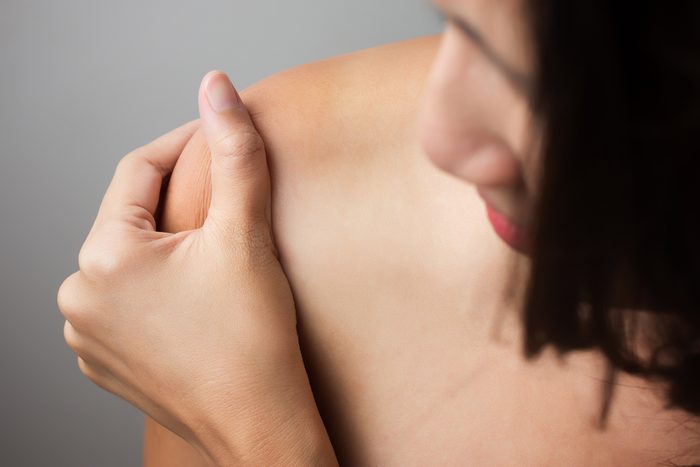
A funky-feeling arm
“I felt like my arm was asleep,” says Tara Robinson, a school counselor, who, incredibly, survived three heart attacks in one week at the age of 40. For the first two, the feeling would emerge for a couple of minutes and then go away. By the time she arrived at the hospital after the third—when the sensations were more intense and persistent—the symptoms were gone and she was sent back home without treatment. “I thought maybe I was working out too hard at the gym or I slept on my arm wrong,” she says.
Another heart attack survivor, Lilly Rocha, described general soreness in her entire upper left side, in her arm along with her jaw and chest. Rocha was traveling a lot for her career and regularly flying internationally, so she attributed the soreness to the stress of travel. It wasn’t until a co-worker (who had himself experienced a heart attack) insisted on taking her to a hospital did she realize the shocking truth: She’d just had a heart attack.
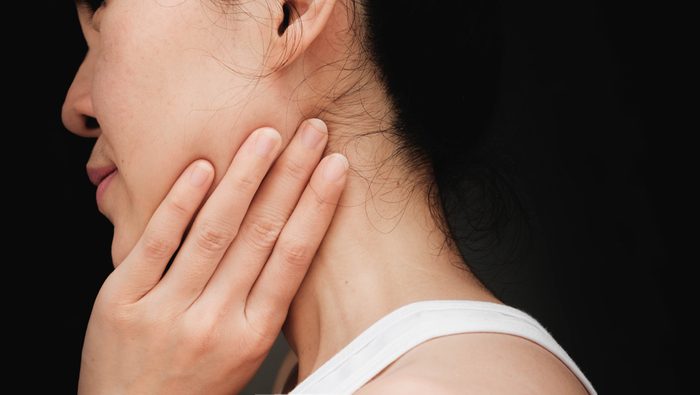
A really sore jaw
Along with arm issues, fatigue, and shortness of breath, jaw problems often emerge months before an attack and then intensify during the actual event. “It’s like the way your mouth feels after you’ve come home from the dentist and the Novocaine hasn’t quite worn off,” Robinson describes.
As with the arm, the jaw also acts up because of what doctors call “referred” pain, explains Suzanne Steinbaum, DO, attending cardiologist and the director of Women’s Cardiovascular Prevention, Health, and Wellness at The Mount Sinai Hospital in New York City and author of Suzanne Steinbaum’s Heart Book: Every Woman’s Guide to a Heart-Healthy Life. “That pain comes from the heart,” she says.
Dr. McSweeney recalls a patient who first complained about her jaw to her dentist and was given treatment for TMJ. When that didn’t help, her wisdom tooth was removed. Of course, the pain only got worse—until she ended up in the hospital with a heart attack and was finally properly treated.
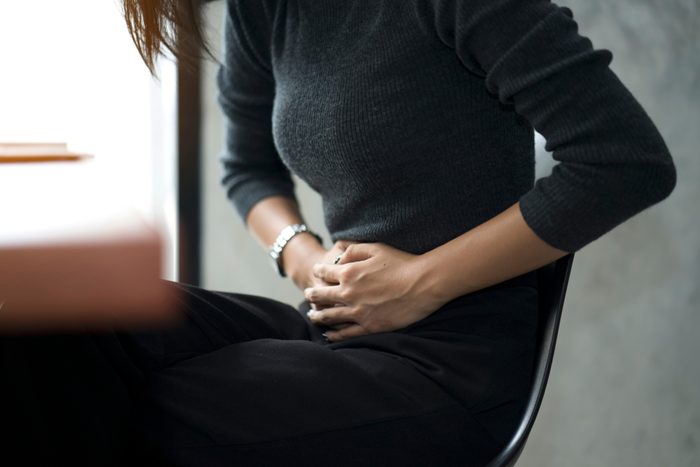
Nausea and vomiting
In a 2018 Circulation study that examined women and men who experienced a heart attack before age 55, two-thirds of women said they’d experienced epigastric (upper-abdominal) issues, such as indigestion, nausea, or stomach pain, notes Dr. Lichtman, the article’s lead author. Only half the men reported similar problems.
As Robinson describes that day she was rushed to the hospital with her third heart attack: “I wanted to vomit so badly.” After treatment, she adopted lifestyle changes that included eating a heart-healthy diet—and she now helps lead other patients in living healthier.
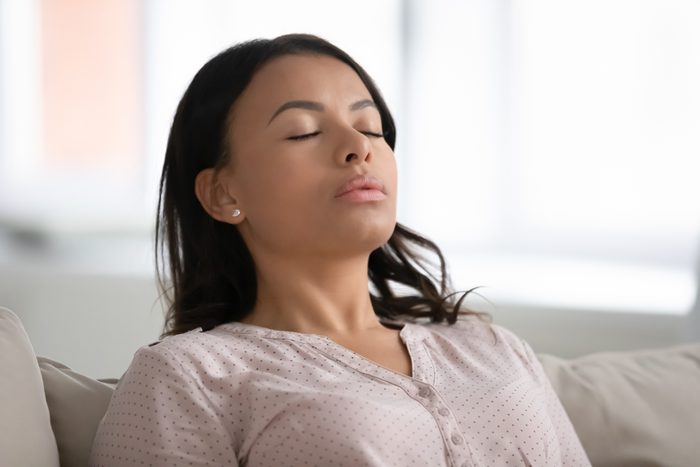
Shortness of breath
An early symptom of a heart condition can be the need to prop yourself up in bed in order to breathe better. “You feel out of breath because when your arteries are blocked, there is not enough oxygen being delivered throughout the body,” explains Dr. Steinbaum. “If the heart has been damaged or a heart attack is happening, the heart may not have the ability to push the blood forward and this can cause fluid to back up into the lungs.”

Extreme fatigue
“Women tend to dismiss heart attack symptoms because we are used to feeling uncomfortable on a monthly basis,” says Dr. Steinbaum. “The key to knowing when to get checked is to assess whether the things you do every day, and are normal for you, suddenly become difficult or you get symptoms while trying to do them.” Robinson remembers having to crawl back to her bedroom after cleaning her shower; she felt weak and wanted to take a nap.
Dr. McSweeney tells of one patient who reported being so tired that she could only make one side of the bed. She needed to rest before making the other. “It’s not this pronounced in every woman,” says Dr. McSweeney, the lead author of the American Heart Association’s Scientific Statement on women and heart disease. But if the fatigue gets progressively worse, or you don’t feel better after you’ve slept, you should see your doctor.
It’s easy to write off fatigue as a side effect of life—aging, working, caring for children and parents (sometimes simultaneously) and other general life stresses. For women, the hormonal changes of perimenopause and menopause can be exhausting. “In the many discussions of health equity, a large, underserved, and poorly managed population in medicine and clinical trials is the menopausal woman,” Dr. Morgan says. “During menopause, lipid levels rise, and women’s risk of heart attacks only further increases.” In short: It might not be “just fatigue.”
This Is Exactly What to Do If You Think You’re Having a Heart Attack
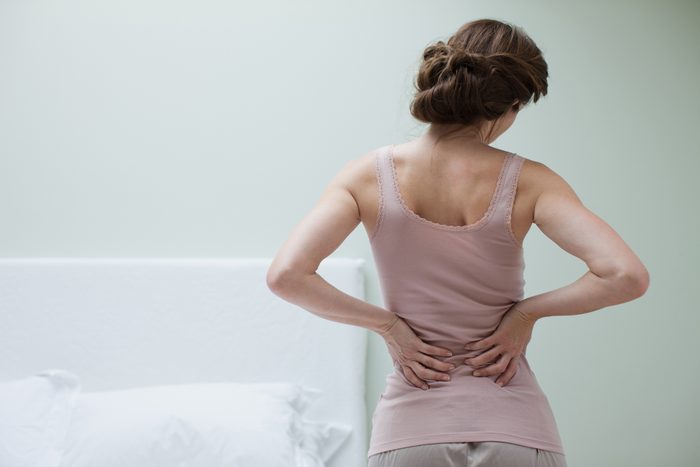
Upper-back pain
Robinson reports that her back problem was the only symptom she’d describe as actually painful. “It felt as if it was behind my heart,” she says.
Other women have described it as a sharp pain between the shoulder blades, which intensified at the time of the heart attack. Here are nine physical and emotional ways female heart disease is different.
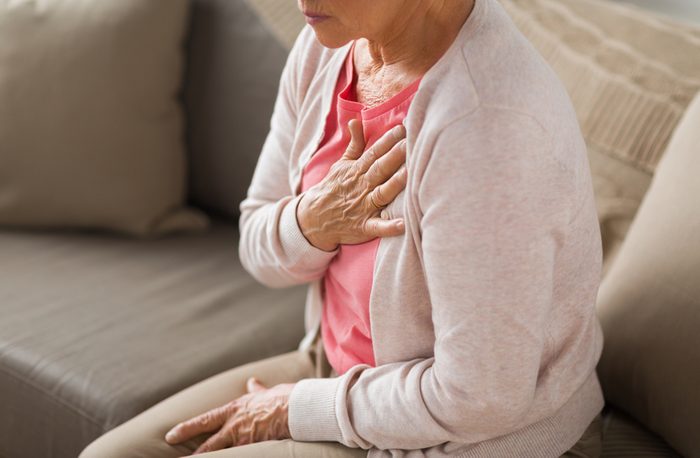
An odd feeling in the chest
Women don’t necessarily describe it as “chest pain.” “They may call it ‘chest tightness’ or ‘chest pressure,’” says Dr. Lichtman, who adds that women may not associate their symptoms with a heart attack because they’re experiencing other symptoms unrelated to the chest, like fatigue or muscle pain.
“I felt a strong tingling sensation,” Rocha recalls. “Almost like electricity was shooting out of my chest.” She recalls that the sensation would come and go, and in the beginning would lasted two or three minutes at a time.
About six months before her heart attack, Rocha went to her primary care physician (who was also her OBGYN) because she was convinced she had breast cancer. The doctor did a breast exam, found nothing, and sent her home. Rocha eventually noticed that her entire left side—chest, jaw, and arm—just felt “weird.”
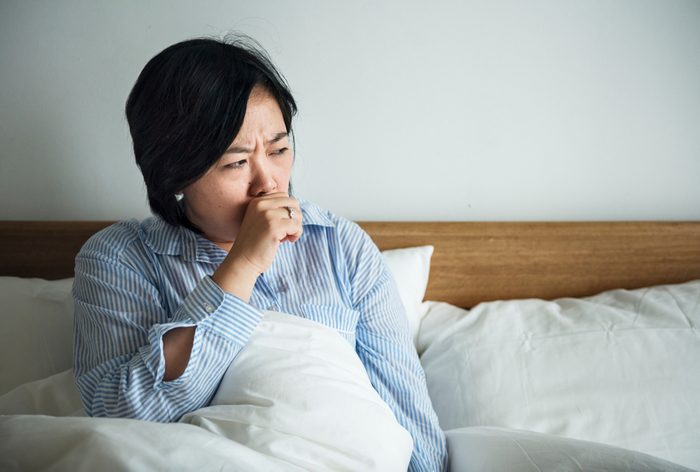
Flu-like symptoms
“Women might say, ‘I’m so tired. I must have a virus,’” says Dr. Steinbaum. They might convince themselves that all they have are flu symptoms, many of which resemble the conditions above, including body aches, fatigue, and nausea, which can also be signs of menopause and dismissed.
Trust that you know your body. If the sensations seem different or more intense than anything you’ve felt before, get it checked out. While they may turn out not to be symptoms of a heart condition or precursors to a heart attack, you’re better off ruling out the possibility—even if you’re under 55 and especially if you have a family history of early-onset heart disease.
High blood pressure
During pregnancy, many women experience pre-eclampsia, eclampsia, hypertension, or even gestational diabetes, and Dr. Morgan says this is this is akin to failing a stress test. “After the healthy baby is delivered safely, these women should be referred to a cardiologist for follow-up because their risk of heart disease is now twice as high as a woman who did not experience these complications,” Dr. Morgan says. “But many women still do not receive the specialty care they deserve after delivery.”
Dr. Montana De La Cadena points out that high blood pressure or hypertension puts women approximately three times at a greater risk of developing heart failure. “What’s extremely important to emphasize is that there are cardiovascular risk factors unique to women that most female patients don’t know about,” she says. “These conditions include hypertensive disorders like pre-eclampsia, as well as gestational diabetes, pre-term birth, pregnancy loss, premature menopause and polycystic ovarian syndrome.”
Women who have had these complications during pregnancy should follow-up with their primary care physician to monitor hypertension and diabetes. Their increased risk for developing cardiovascular diseases should be considered in hopes of preventing cardiovascular disease.
- This Is the Best Diet for Your Heart, Says New Report
- 5 Subtle Signs Your Back Pain Means Something Serious, from a Spinal Surgeon
- This Natural Sweetener May Lower Cholesterol and Blood Sugar, New Study Says
Additional writing and reporting by Jaime Stathis
